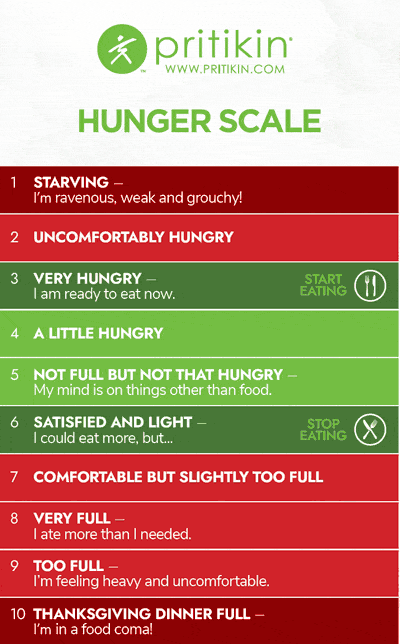Should I eat breakfast if I’m not hungry?

But when some of us wake up in the morning, we’re just not hungry. So we want to know: “Why eat – and take in calories – if I’m not interested in eating?”
Important thinking on the subject recently came from one of the leading experts on food and obesity in the U.S. – Dr. David Allison of the Nutrition Obesity Research Center at the University of Alabama. He and colleagues conducted an exhaustive review of 92 studies, published in the American Journal of Clinical Nutrition, of the research on breakfast and body weight.1
They concluded that while there is a great deal of evidence on the subject, there is very little strong evidence.
Breakfast and Weight Loss
Trying to lose weight? You’ve probably been told that you need to eat breakfast because skipping breakfast will lead to weight gain.
But a comprehensive review of the research published on the subject, and conducted by one of America’s leading experts on obesity, concluded that the evidence on skipping breakfast and weight gain is weak.
Most of the studies were observational, which means these articles simply suggested an association between breakfast and weight change. There may have been other behaviors common among breakfast eaters, like a healthier diet overall, that were the real protectors against weight gain.
Few of the studies the scientists reviewed, very few, showed any causal relation between breakfast and body weight. That’s because very few were randomized controlled trials, the gold standard of scientific research.
Put simply, we do not have hard data showing that eating breakfast caused weight loss or protected against obesity. Nor do we have strong evidence that skipping breakfast led to weight gain.

Learn More About Pritikin
Biased interpretations
In their review of the literature, errors that Dr. Allison and co-authors frequently found were biased interpretations of results, possibly in part due to the “halo-effect” of breakfast. “Frequent assertions of the general benefits of consuming breakfast, most easily summarized as ‘breakfast is the most important meal of the day,’ could potentially predispose individuals to ascribe other positive attributes to breakfast,” the University of Alabama authors wrote.
Other common errors they found included “improper use of causal language in describing one’s own results” and “improper use of causal language in citing others’ work.” Observational evidence, in short, was made to sound causal.

Overall, it was not a pretty picture of scientific research, at least in the field of breakfast eating and body weight.
The repercussions can be profound. “When research reporting is biased, the integrity of scientific information deteriorates because it drifts from the original source, much like the childhood game of ‘telephone,'” Dr. Allison and his team concluded.
“As writers and reviewers, we need to be vigilant for lapses in objectivity and for studies of nonprobative value to hopefully keep scientific beliefs grounded in scientific evidence.”
The Pritikin Perspective
The registered dietitians, physicians, and other faculty at the Pritikin Longevity Center agree with the conclusions of the University of Alabama scientists. States Kimberly Gomer, MS, RD, LDN, Pritikin’s Director of Nutrition: “The assertion that we all must eat breakfast, or that skipping breakfast promotes weight gain, rests on very weak credible data.”
There are, unfortunately, many truisms in the world of nutrition that are not true at all.
Others include “we should drink eight glasses of water a day” and “we must eat every three hours to keep our metabolism going.”
“These myths propagate themselves because they sound good and virtually every diet/guru person latches onto them, but the science is scant at best,” asserts Gomer.
“And, certainly, the breakfast cereal industry wants to promote the belief that we must eat breakfast because it makes people think they have to eat a bowl of cereal every morning.”
Insulin-dependent diabetes
There are exceptions – people who do likely need to eat something first thing in the morning. They include individuals who have insulin-dependent diabetes as well as those taking medications in the morning that must be swallowed with food.

The Hunger Scale
But for the rest of us, it’s time to rethink breakfast. For this meal – actually, for any meal or snack – what’s most important is listening to our hunger and satiety signals.
Don’t eat simply because it’s 7 a.m. Eat when you’re hungry, when you’re at No 3 on The Hunger Scale (“I’m really hungry – I’m ready to eat now”), whether that’s 6:30 a.m. or 10:30 a.m.
So we’re not really saying: Don’t skip breakfast. We’re saying: Wait till you’re hungry, and when you are, enjoy healthy breakfast foods, or a hearty and healthy mid-morning snack, like a big apple, carrots and Pritikin hummus, or a bowl of Pritikin bean-rich soup.
Do make sure that you don’t wait till you’re uncomfortably hungry (No. 2 on The Hunger Scale) or starving and ravenous (No. 1) because by then you’re far more likely to reach for a ham and cheese croissant instead of a healthy breakfast like oatmeal and fruit.
Why aren’t you hungry?
But (and this is a very big “but”) we’ve got to back up a bit. If you’re not hungry in the morning, a really important question to ask yourself is: Why? What did you eat the night before?
The fact is, many people wake up with no appetite because they ate too much the night before. Come morning, they’re having a food hangover.
“A lot of how we eat is habit,” says Pritikin dietitian Kimberly Gomer. “If we are in the habit of overeating at night and skipping breakfast, that is what our body becomes accustomed to.”
The really good news is that our appetites can change, and quickly so.
For the past four decades we’ve watched thousands of people arrive at the Pritikin Longevity Center saying, “Oh, I never eat breakfast” but then, after a week, they’re different people.
“They’re waking up here at Pritikin and actually feeling hungry,” smiles Pritikin Medical Director and educator Dr. Danine Fruge. “The minute they open their eyes, they’re eagerly anticipating our breakfast of gorgeous fresh fruit, hot cereals, and egg-white omelets.
“The good news, too, is that they’re often very different people in many other ways. They have renewed energy. They feel like working out in the gym. They’re losing their afternoon and evening food cravings. And their blood sugar, blood pressure, and body weights are often looking much better.”
Agrees Pritikin dietitian Kimberly: “Once people get into a Pritikin way of eating, very few are saying, ‘Oh, I never eat breakfast.’ They love breakfast now, and their pantries and refrigerators are well stocked with healthy breakfast foods.”
New appetites
So don’t accept what you’ve been doing and feeling for the last 20, 30, or 40 years as a done deal. As you change your life, as you start to live and eat Pritikin-style, your appetite will likely change, too.
Breakfast skipping may also be the result of factors other than no appetite. “I’ve known many patients who skip breakfast because of rushed schedules or general stresses in their lives. They’re hungry, but they just can’t seem to carve out time to eat before bolting out the door. Unfortunately, no food in the morning often leads to a pattern of overcompensation at night,” observes Dr. Fruge.
Now, there are those of us who, no matter what, just are not hungry in the morning. Never have been. And likely never will be.
Planning ahead
If you’re in this camp, do get in the habit of planning ahead. When hunger hits around 10 a.m., you don’t want to be staring at your co-worker’s desk with the bowl of M and M’s and thinking, “I’m famished, and this is the only food in sight.”
Portable healthy breakfast foods
Pack a healthy breakfast, such as a bag of oatmeal, a banana, and a cup of nonfat yogurt. Keep a cereal bowl in your desk drawer. The minute you walk into the office, pour your oatmeal into that bowl. Have it all ready so that when you get hungry, all you have to do is pop your bowl in the microwave and peel your banana.
Another tip: Find an eatery that you pass every day on your way to work that has healthy breakfast choices like fresh cut-up fruit in a bowl, egg-white/whole-grain-bread sandwiches, or tofu scrambles with veggies. If you’re a regular, you might even be able to get the cooks in the habit of preparing your food without salt, butter, and other fats. The minute they see you, they know what to do. Tip them well.
Bottom Line:
It’s not what time you eat that matters. It’s how you feel.
Don’t ask yourself, “Should I eat breakfast?”
Instead, ask yourself, “Am I hungry?” If you are, eat. And eat till you’re satisfied, lightly so. Don’t eat till you’re stuffed.
And, certainly, eat well. Fill your day with a lot of beautiful fruits and vegetables, plus beans, starchy vegetables like potatoes and yams, rich and nutty whole grains like oats, whole-wheat pasta, quinoa, couscous, and barley, prudent servings of lean protein like fish, and calcium-rich foods like fat-free yogurt and soymilk.
“If you do, you’ll not only be living well, you’ll likely be shedding excess weight,” sums up Dr. Danine Fruge.
